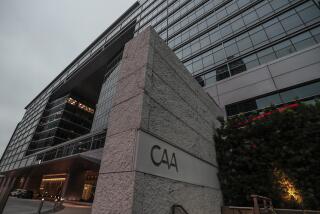Grey Ad Firm Gets Order for Carl’s Account : Advertising: Pact is valued at $20 million a year. L.A. shop has served as interim agency since October. It won’t say whether founder-pitchman Carl Karcher will return as commercial star.
- Share via
ANAHEIM — Carl Karcher Enterprises has appointed Grey Advertising in Los Angeles to handle its advertising account, which has an estimated value of more than $20 million annually.
The company declined to comment on whether founder Carl N. Karcher is likely to return as the Carl’s Jr. television pitchman.
Karcher, 76, was ousted as chairman on Oct. 1 after a bitter dispute with a majority of Karcher Enterprises’ board over the company’s strategic direction. Karcher subsequently was invited back as chairman emeritus. The board and Karcher are now negotiating Karcher’s salary and job description.
Observers questioned whether the 76-year-old founder is what the company’s advertising needs now.
“They’ve got to get back to selling hamburgers instead of animation and (Happy) Stars,” said John Vrba, senior vice president of Western International Media in Newport Beach. “They’ve got to show the merchandise, create appetite appeal.”
And that’s what Grey Advertising has been doing since October as Karcher Enterprises’ interim ad agency--creating ads that focus on the company’s products.
“We’d support whatever (creative ideas) it takes to move top-line revenue,” said Karcher Enterprises Chief Financial Officer Loren Pannier. “Ever since (Grey Advertising) took over (from Goodby, Berlin & Silverstein in San Francisco), we’ve had a new look and feel to our ads on television. . . . I think our advertising in the past was generally thought to be more image-oriented. . . . Now it’s more product- and food-oriented.”
Andrew Puzder, Karcher’s personal attorney, said he is unsure what role Karcher hoped to play in the company’s future advertising.
“Carl would love to come back, he’ll do whatever the company asks him to do in order to boost sales,” Puzder said. “But we’ve had no conversations with the company about a role for him.” The founder was an important symbol of the chain’s identity in 1990 when Goodby, Berlin & Silverstein took over the account, said Jeff Goodby, chairman. “That’s why we put him into the animation,” he said.
Given the battle within the fast-food company, Goodby said, he did not want to comment on whether Karcher remains an important symbol.
Putting Karcher in front of the camera was, at one time, a way to differentiate the fast-food chain from its numerous competitors, said Ken Sakoda, who worked on the account several years earlier.
“As I’ve watched different executions (of Carl’s Jr. commercials), they’re very stiff and contrived, but I don’t know whose fault that was,” said Sakoda, a creative director with Bozell/SMS in Costa Mesa. “Either the agencies have been limited or Carl has limited what he’s allowed them to do.”
Sales at Carl’s Jr. 649 restaurants, which are located primarily in California, Nevada, Oregon, Arizona and Mexico, have been slipping for more than three years. The Anaheim-based company has lost market share to larger competitors who have developed menus that are more in keeping with consumer demand for better values. Karcher Enterprises, always known for quality food that’s a bit more expensive, is now experimenting with a “value-oriented” 99-cent menu at restaurants in Bakersfield and Las Vegas.
Karcher Enterprises is also attempting to reduce the number of items on its somewhat cluttered menu, and is trimming corporate overhead to bolster profitability.
Sakoda said he would not recommend going too far with the low-priced strategy, which Taco Bell pioneered and which has as its most recent convert Irvine-based El Pollo Loco.
“When we come out of the recession and all you can be remembered for is having the cheapest hamburger, the cheapest chicken or the cheapest taco, that’s not being remembered for much,” he said. “You’ve got to start building brand all over again.”
A spokeswoman for Grey Advertising declined to comment on whether the contract would mean additional employment at the Los Angeles-based agency. She also declined to comment on possible directions that Karcher Enterprises’ advertising might take.
Grey Advertising was among three finalists for the account. The two others were Lord, Dentsu & Partners and Mendelsohn/Zien, both in Los Angeles.
Many agencies that were contacted by Karcher Enterprises reportedly refused to consider the account, because it was offering well under the standard 15% commission.
More to Read
The biggest entertainment stories
Get our big stories about Hollywood, film, television, music, arts, culture and more right in your inbox as soon as they publish.
You may occasionally receive promotional content from the Los Angeles Times.









